Globalization, Outsourcing, and Coca-Cola: A Case Study Analysis
VerifiedAdded on 2021/05/27
|17
|3871
|37
Report
AI Summary
This report analyzes the multifaceted impact of globalization on businesses, particularly focusing on outsourcing and off shoring strategies. It explores how these processes have reshaped economic landscapes and international business practices. The report uses the Coca-Cola Company as a case study to illustrate the challenges, opportunities, and problems associated with globalization. It examines the company's journey in international markets, its entry strategies, the challenges it faced, and the adaptations it made to succeed. The analysis covers various aspects, including cultural, political, and competitive challenges, and the strategies employed by Coca-Cola to overcome them. The report highlights the importance of strategic management, sound decision-making, and acquisitions in expanding global operations and leveraging opportunities presented by changing consumer preferences and market dynamics. The study underscores the need for global managers to develop key knowledge and skills to navigate the complexities of a globalized business environment.
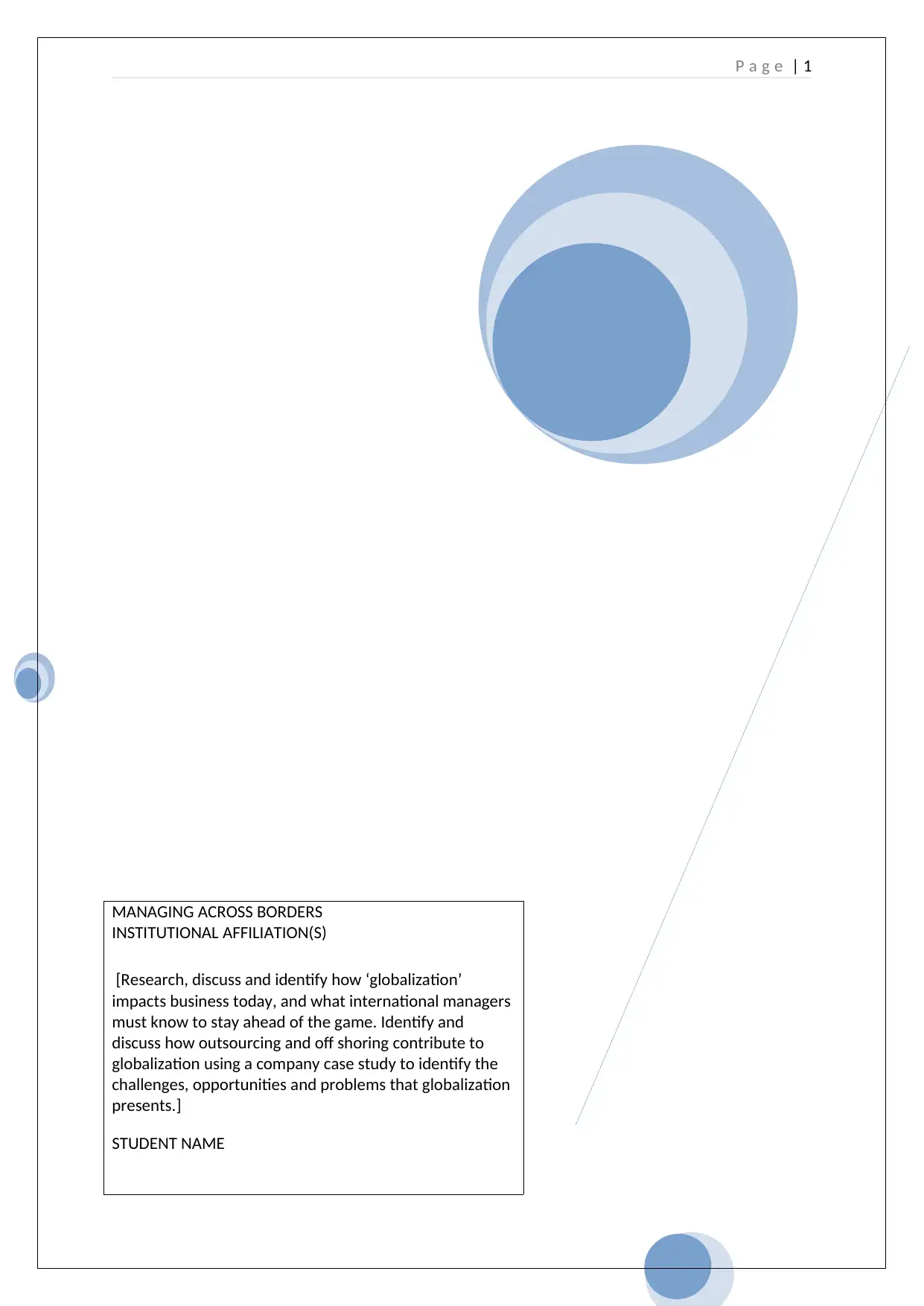
P a g e | 1
MANAGING ACROSS BORDERS
INSTITUTIONAL AFFILIATION(S)
[Research, discuss and identify how ‘globalization’
impacts business today, and what international managers
must know to stay ahead of the game. Identify and
discuss how outsourcing and off shoring contribute to
globalization using a company case study to identify the
challenges, opportunities and problems that globalization
presents.]
STUDENT NAME
MANAGING ACROSS BORDERS
INSTITUTIONAL AFFILIATION(S)
[Research, discuss and identify how ‘globalization’
impacts business today, and what international managers
must know to stay ahead of the game. Identify and
discuss how outsourcing and off shoring contribute to
globalization using a company case study to identify the
challenges, opportunities and problems that globalization
presents.]
STUDENT NAME
Paraphrase This Document
Need a fresh take? Get an instant paraphrase of this document with our AI Paraphraser
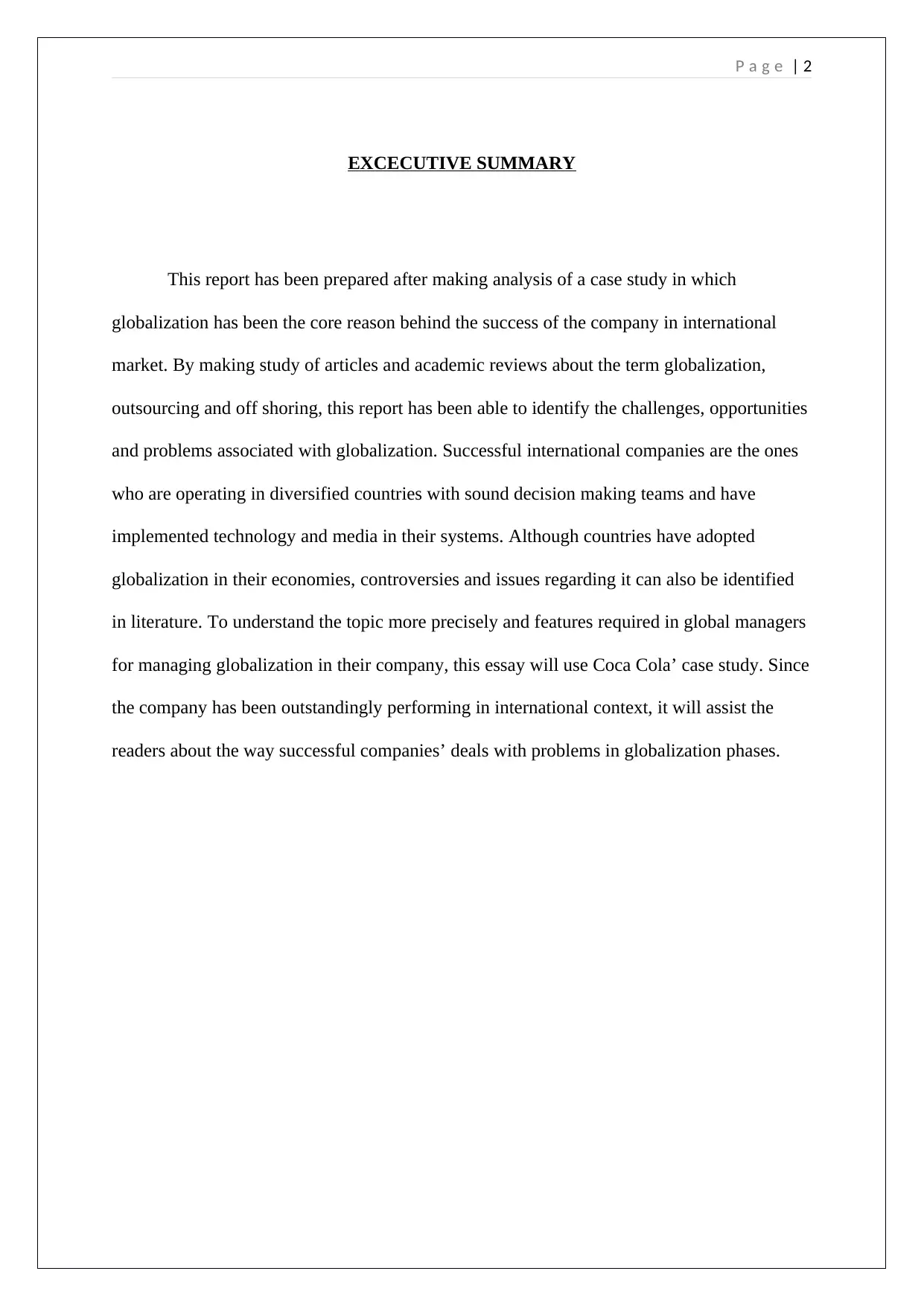
P a g e | 2
EXCECUTIVE SUMMARY
This report has been prepared after making analysis of a case study in which
globalization has been the core reason behind the success of the company in international
market. By making study of articles and academic reviews about the term globalization,
outsourcing and off shoring, this report has been able to identify the challenges, opportunities
and problems associated with globalization. Successful international companies are the ones
who are operating in diversified countries with sound decision making teams and have
implemented technology and media in their systems. Although countries have adopted
globalization in their economies, controversies and issues regarding it can also be identified
in literature. To understand the topic more precisely and features required in global managers
for managing globalization in their company, this essay will use Coca Cola’ case study. Since
the company has been outstandingly performing in international context, it will assist the
readers about the way successful companies’ deals with problems in globalization phases.
EXCECUTIVE SUMMARY
This report has been prepared after making analysis of a case study in which
globalization has been the core reason behind the success of the company in international
market. By making study of articles and academic reviews about the term globalization,
outsourcing and off shoring, this report has been able to identify the challenges, opportunities
and problems associated with globalization. Successful international companies are the ones
who are operating in diversified countries with sound decision making teams and have
implemented technology and media in their systems. Although countries have adopted
globalization in their economies, controversies and issues regarding it can also be identified
in literature. To understand the topic more precisely and features required in global managers
for managing globalization in their company, this essay will use Coca Cola’ case study. Since
the company has been outstandingly performing in international context, it will assist the
readers about the way successful companies’ deals with problems in globalization phases.
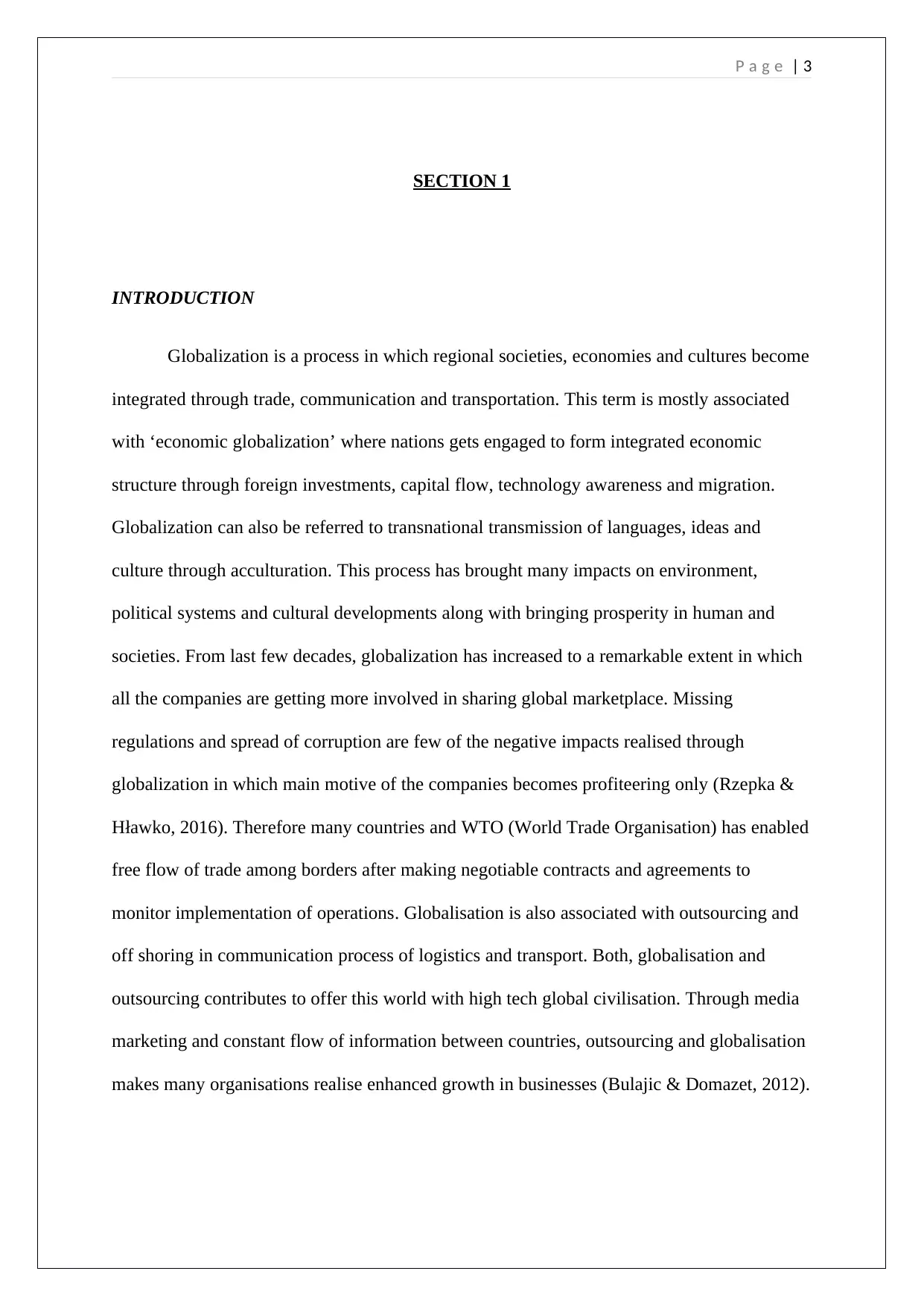
P a g e | 3
SECTION 1
INTRODUCTION
Globalization is a process in which regional societies, economies and cultures become
integrated through trade, communication and transportation. This term is mostly associated
with ‘economic globalization’ where nations gets engaged to form integrated economic
structure through foreign investments, capital flow, technology awareness and migration.
Globalization can also be referred to transnational transmission of languages, ideas and
culture through acculturation. This process has brought many impacts on environment,
political systems and cultural developments along with bringing prosperity in human and
societies. From last few decades, globalization has increased to a remarkable extent in which
all the companies are getting more involved in sharing global marketplace. Missing
regulations and spread of corruption are few of the negative impacts realised through
globalization in which main motive of the companies becomes profiteering only (Rzepka &
Hławko, 2016). Therefore many countries and WTO (World Trade Organisation) has enabled
free flow of trade among borders after making negotiable contracts and agreements to
monitor implementation of operations. Globalisation is also associated with outsourcing and
off shoring in communication process of logistics and transport. Both, globalisation and
outsourcing contributes to offer this world with high tech global civilisation. Through media
marketing and constant flow of information between countries, outsourcing and globalisation
makes many organisations realise enhanced growth in businesses (Bulajic & Domazet, 2012).
SECTION 1
INTRODUCTION
Globalization is a process in which regional societies, economies and cultures become
integrated through trade, communication and transportation. This term is mostly associated
with ‘economic globalization’ where nations gets engaged to form integrated economic
structure through foreign investments, capital flow, technology awareness and migration.
Globalization can also be referred to transnational transmission of languages, ideas and
culture through acculturation. This process has brought many impacts on environment,
political systems and cultural developments along with bringing prosperity in human and
societies. From last few decades, globalization has increased to a remarkable extent in which
all the companies are getting more involved in sharing global marketplace. Missing
regulations and spread of corruption are few of the negative impacts realised through
globalization in which main motive of the companies becomes profiteering only (Rzepka &
Hławko, 2016). Therefore many countries and WTO (World Trade Organisation) has enabled
free flow of trade among borders after making negotiable contracts and agreements to
monitor implementation of operations. Globalisation is also associated with outsourcing and
off shoring in communication process of logistics and transport. Both, globalisation and
outsourcing contributes to offer this world with high tech global civilisation. Through media
marketing and constant flow of information between countries, outsourcing and globalisation
makes many organisations realise enhanced growth in businesses (Bulajic & Domazet, 2012).
⊘ This is a preview!⊘
Do you want full access?
Subscribe today to unlock all pages.

Trusted by 1+ million students worldwide
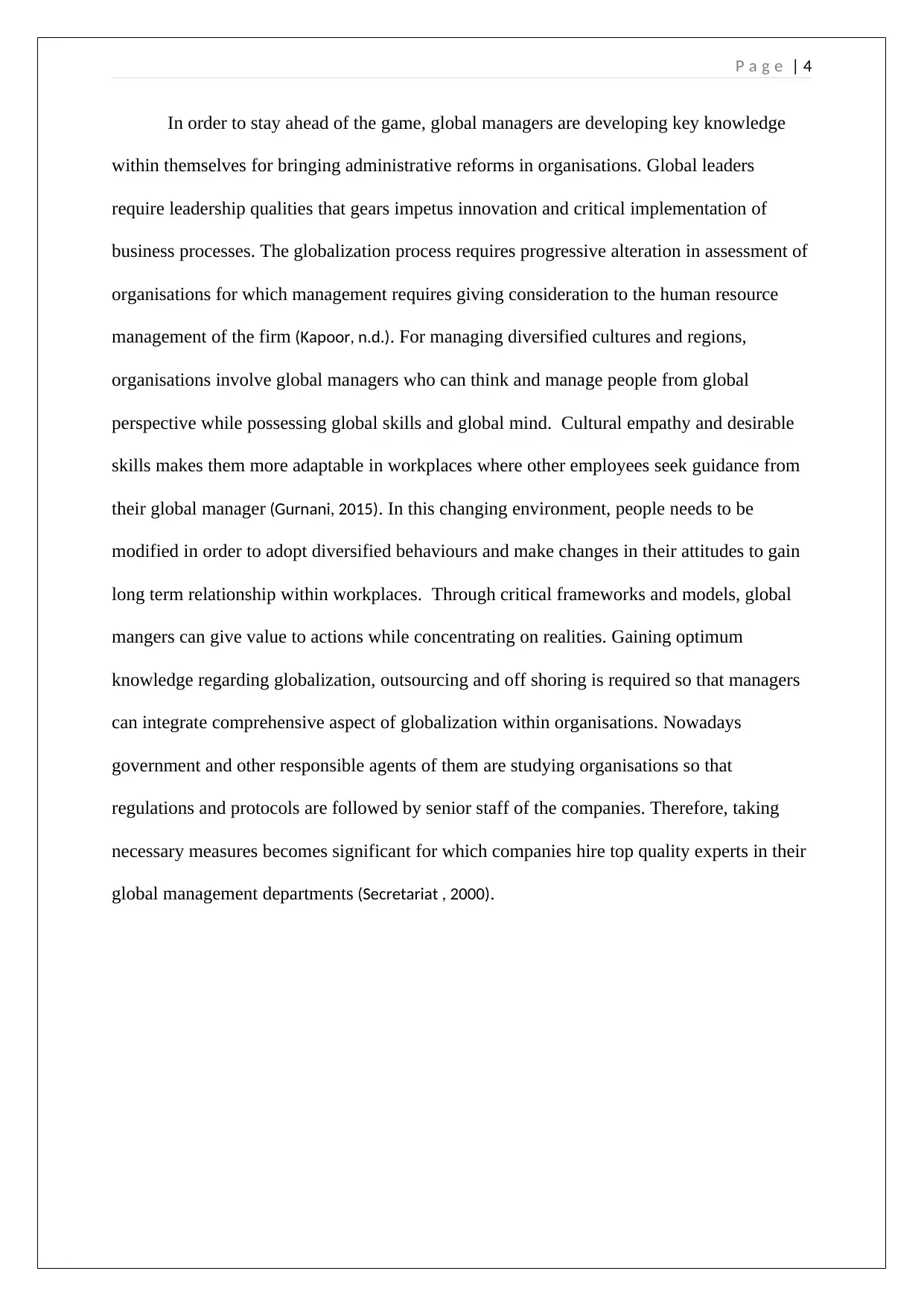
P a g e | 4
In order to stay ahead of the game, global managers are developing key knowledge
within themselves for bringing administrative reforms in organisations. Global leaders
require leadership qualities that gears impetus innovation and critical implementation of
business processes. The globalization process requires progressive alteration in assessment of
organisations for which management requires giving consideration to the human resource
management of the firm (Kapoor, n.d.). For managing diversified cultures and regions,
organisations involve global managers who can think and manage people from global
perspective while possessing global skills and global mind. Cultural empathy and desirable
skills makes them more adaptable in workplaces where other employees seek guidance from
their global manager (Gurnani, 2015). In this changing environment, people needs to be
modified in order to adopt diversified behaviours and make changes in their attitudes to gain
long term relationship within workplaces. Through critical frameworks and models, global
mangers can give value to actions while concentrating on realities. Gaining optimum
knowledge regarding globalization, outsourcing and off shoring is required so that managers
can integrate comprehensive aspect of globalization within organisations. Nowadays
government and other responsible agents of them are studying organisations so that
regulations and protocols are followed by senior staff of the companies. Therefore, taking
necessary measures becomes significant for which companies hire top quality experts in their
global management departments (Secretariat , 2000).
In order to stay ahead of the game, global managers are developing key knowledge
within themselves for bringing administrative reforms in organisations. Global leaders
require leadership qualities that gears impetus innovation and critical implementation of
business processes. The globalization process requires progressive alteration in assessment of
organisations for which management requires giving consideration to the human resource
management of the firm (Kapoor, n.d.). For managing diversified cultures and regions,
organisations involve global managers who can think and manage people from global
perspective while possessing global skills and global mind. Cultural empathy and desirable
skills makes them more adaptable in workplaces where other employees seek guidance from
their global manager (Gurnani, 2015). In this changing environment, people needs to be
modified in order to adopt diversified behaviours and make changes in their attitudes to gain
long term relationship within workplaces. Through critical frameworks and models, global
mangers can give value to actions while concentrating on realities. Gaining optimum
knowledge regarding globalization, outsourcing and off shoring is required so that managers
can integrate comprehensive aspect of globalization within organisations. Nowadays
government and other responsible agents of them are studying organisations so that
regulations and protocols are followed by senior staff of the companies. Therefore, taking
necessary measures becomes significant for which companies hire top quality experts in their
global management departments (Secretariat , 2000).
Paraphrase This Document
Need a fresh take? Get an instant paraphrase of this document with our AI Paraphraser
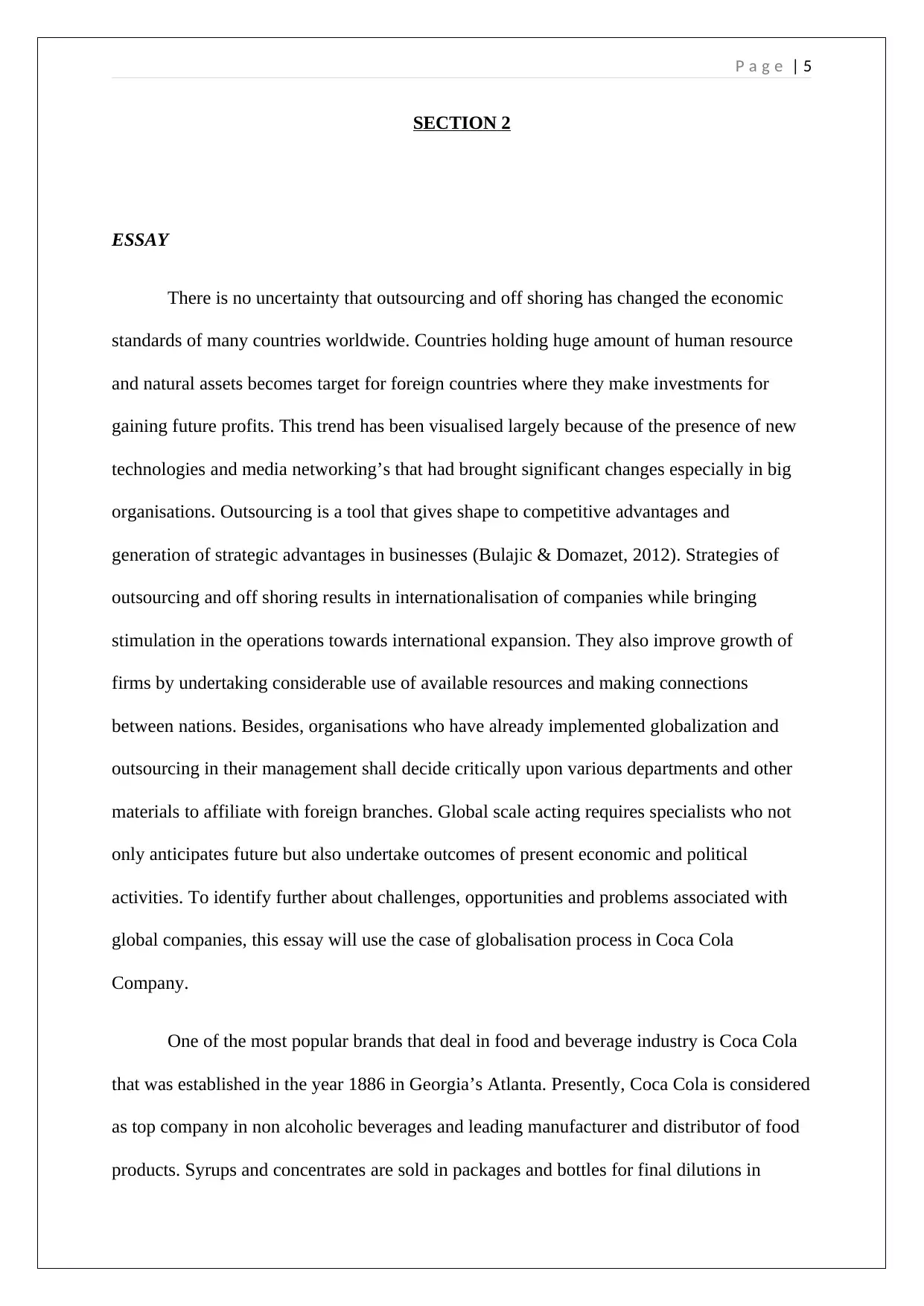
P a g e | 5
SECTION 2
ESSAY
There is no uncertainty that outsourcing and off shoring has changed the economic
standards of many countries worldwide. Countries holding huge amount of human resource
and natural assets becomes target for foreign countries where they make investments for
gaining future profits. This trend has been visualised largely because of the presence of new
technologies and media networking’s that had brought significant changes especially in big
organisations. Outsourcing is a tool that gives shape to competitive advantages and
generation of strategic advantages in businesses (Bulajic & Domazet, 2012). Strategies of
outsourcing and off shoring results in internationalisation of companies while bringing
stimulation in the operations towards international expansion. They also improve growth of
firms by undertaking considerable use of available resources and making connections
between nations. Besides, organisations who have already implemented globalization and
outsourcing in their management shall decide critically upon various departments and other
materials to affiliate with foreign branches. Global scale acting requires specialists who not
only anticipates future but also undertake outcomes of present economic and political
activities. To identify further about challenges, opportunities and problems associated with
global companies, this essay will use the case of globalisation process in Coca Cola
Company.
One of the most popular brands that deal in food and beverage industry is Coca Cola
that was established in the year 1886 in Georgia’s Atlanta. Presently, Coca Cola is considered
as top company in non alcoholic beverages and leading manufacturer and distributor of food
products. Syrups and concentrates are sold in packages and bottles for final dilutions in
SECTION 2
ESSAY
There is no uncertainty that outsourcing and off shoring has changed the economic
standards of many countries worldwide. Countries holding huge amount of human resource
and natural assets becomes target for foreign countries where they make investments for
gaining future profits. This trend has been visualised largely because of the presence of new
technologies and media networking’s that had brought significant changes especially in big
organisations. Outsourcing is a tool that gives shape to competitive advantages and
generation of strategic advantages in businesses (Bulajic & Domazet, 2012). Strategies of
outsourcing and off shoring results in internationalisation of companies while bringing
stimulation in the operations towards international expansion. They also improve growth of
firms by undertaking considerable use of available resources and making connections
between nations. Besides, organisations who have already implemented globalization and
outsourcing in their management shall decide critically upon various departments and other
materials to affiliate with foreign branches. Global scale acting requires specialists who not
only anticipates future but also undertake outcomes of present economic and political
activities. To identify further about challenges, opportunities and problems associated with
global companies, this essay will use the case of globalisation process in Coca Cola
Company.
One of the most popular brands that deal in food and beverage industry is Coca Cola
that was established in the year 1886 in Georgia’s Atlanta. Presently, Coca Cola is considered
as top company in non alcoholic beverages and leading manufacturer and distributor of food
products. Syrups and concentrates are sold in packages and bottles for final dilutions in
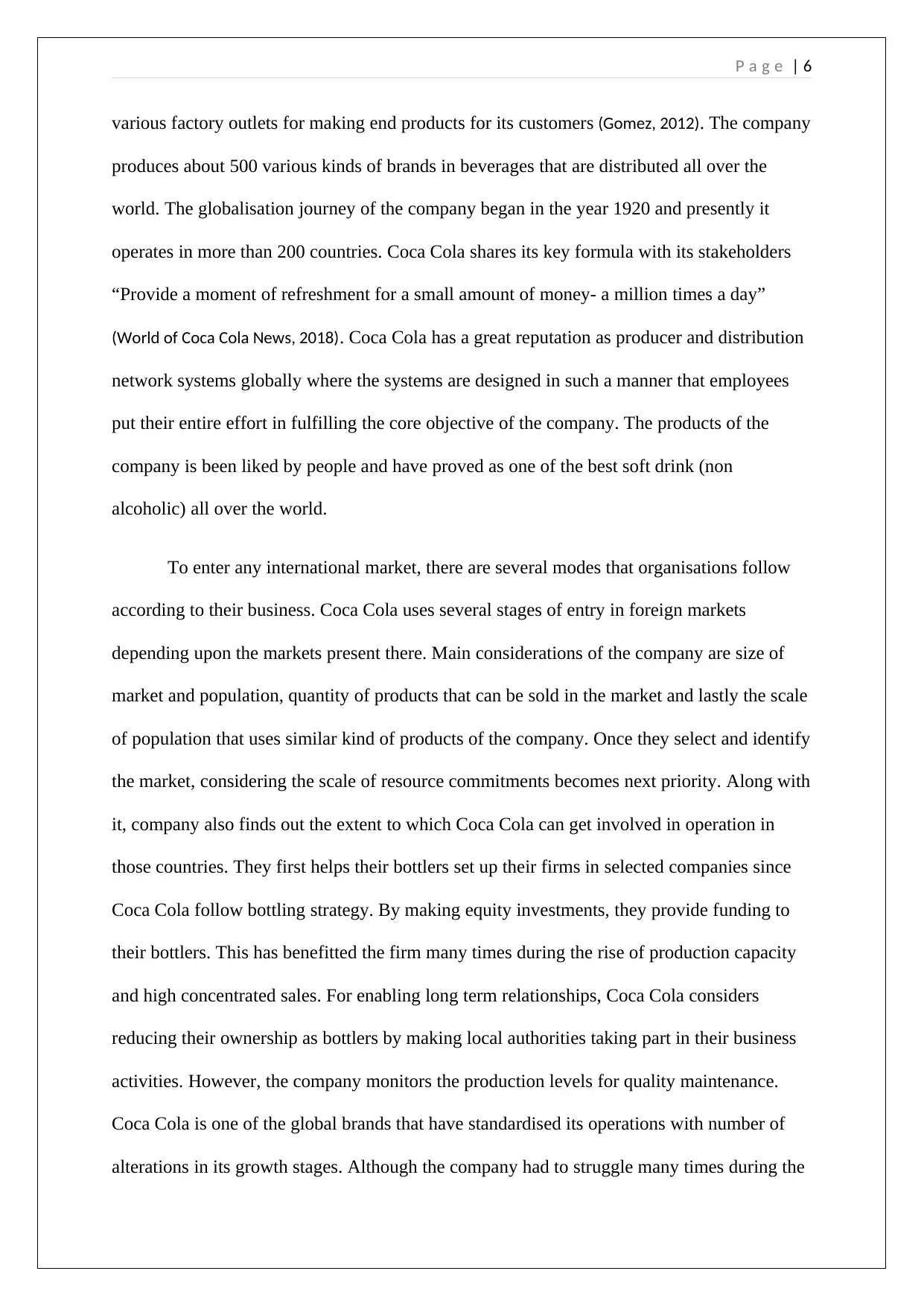
P a g e | 6
various factory outlets for making end products for its customers (Gomez, 2012). The company
produces about 500 various kinds of brands in beverages that are distributed all over the
world. The globalisation journey of the company began in the year 1920 and presently it
operates in more than 200 countries. Coca Cola shares its key formula with its stakeholders
“Provide a moment of refreshment for a small amount of money- a million times a day”
(World of Coca Cola News, 2018). Coca Cola has a great reputation as producer and distribution
network systems globally where the systems are designed in such a manner that employees
put their entire effort in fulfilling the core objective of the company. The products of the
company is been liked by people and have proved as one of the best soft drink (non
alcoholic) all over the world.
To enter any international market, there are several modes that organisations follow
according to their business. Coca Cola uses several stages of entry in foreign markets
depending upon the markets present there. Main considerations of the company are size of
market and population, quantity of products that can be sold in the market and lastly the scale
of population that uses similar kind of products of the company. Once they select and identify
the market, considering the scale of resource commitments becomes next priority. Along with
it, company also finds out the extent to which Coca Cola can get involved in operation in
those countries. They first helps their bottlers set up their firms in selected companies since
Coca Cola follow bottling strategy. By making equity investments, they provide funding to
their bottlers. This has benefitted the firm many times during the rise of production capacity
and high concentrated sales. For enabling long term relationships, Coca Cola considers
reducing their ownership as bottlers by making local authorities taking part in their business
activities. However, the company monitors the production levels for quality maintenance.
Coca Cola is one of the global brands that have standardised its operations with number of
alterations in its growth stages. Although the company had to struggle many times during the
various factory outlets for making end products for its customers (Gomez, 2012). The company
produces about 500 various kinds of brands in beverages that are distributed all over the
world. The globalisation journey of the company began in the year 1920 and presently it
operates in more than 200 countries. Coca Cola shares its key formula with its stakeholders
“Provide a moment of refreshment for a small amount of money- a million times a day”
(World of Coca Cola News, 2018). Coca Cola has a great reputation as producer and distribution
network systems globally where the systems are designed in such a manner that employees
put their entire effort in fulfilling the core objective of the company. The products of the
company is been liked by people and have proved as one of the best soft drink (non
alcoholic) all over the world.
To enter any international market, there are several modes that organisations follow
according to their business. Coca Cola uses several stages of entry in foreign markets
depending upon the markets present there. Main considerations of the company are size of
market and population, quantity of products that can be sold in the market and lastly the scale
of population that uses similar kind of products of the company. Once they select and identify
the market, considering the scale of resource commitments becomes next priority. Along with
it, company also finds out the extent to which Coca Cola can get involved in operation in
those countries. They first helps their bottlers set up their firms in selected companies since
Coca Cola follow bottling strategy. By making equity investments, they provide funding to
their bottlers. This has benefitted the firm many times during the rise of production capacity
and high concentrated sales. For enabling long term relationships, Coca Cola considers
reducing their ownership as bottlers by making local authorities taking part in their business
activities. However, the company monitors the production levels for quality maintenance.
Coca Cola is one of the global brands that have standardised its operations with number of
alterations in its growth stages. Although the company had to struggle many times during the
⊘ This is a preview!⊘
Do you want full access?
Subscribe today to unlock all pages.

Trusted by 1+ million students worldwide
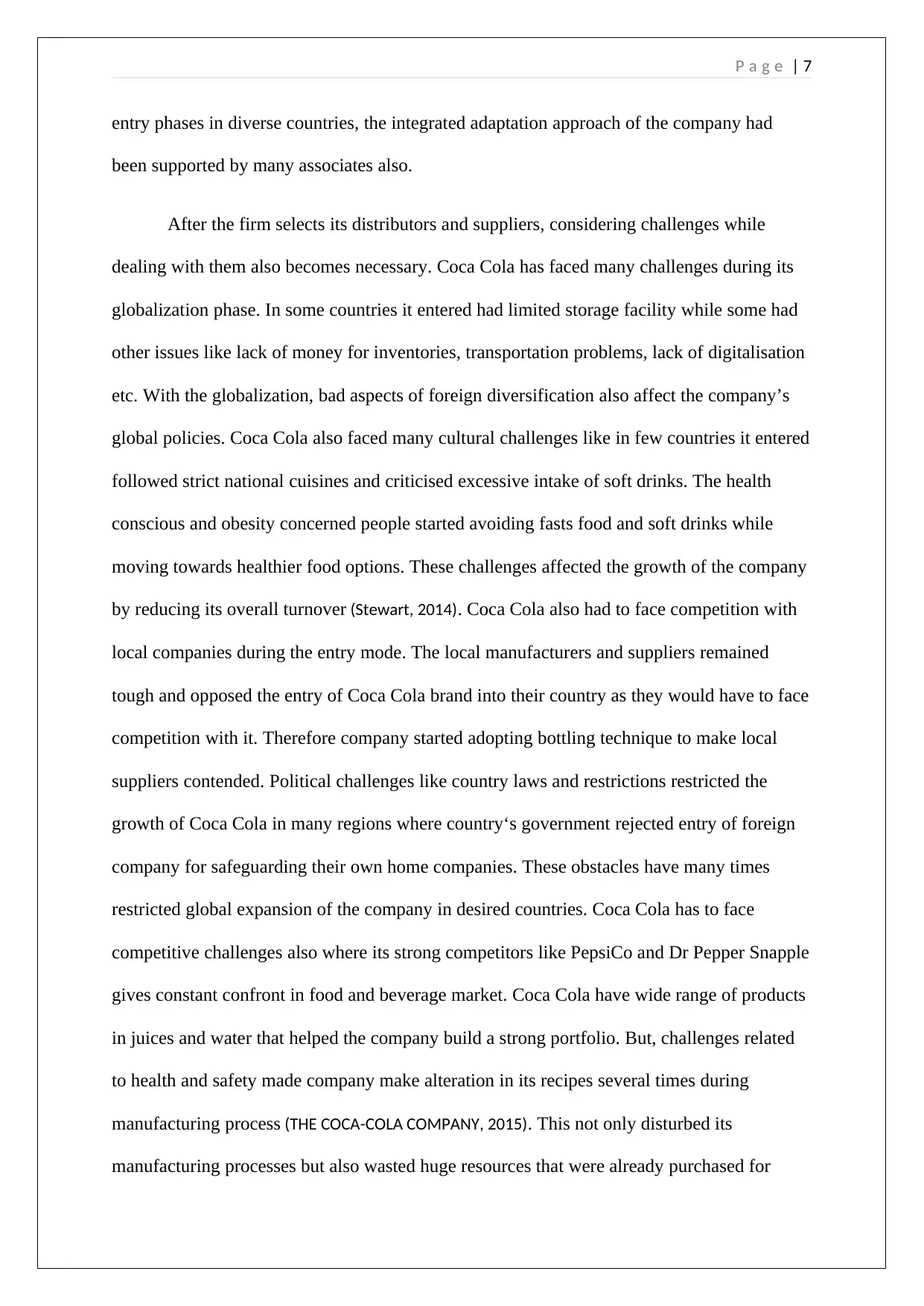
P a g e | 7
entry phases in diverse countries, the integrated adaptation approach of the company had
been supported by many associates also.
After the firm selects its distributors and suppliers, considering challenges while
dealing with them also becomes necessary. Coca Cola has faced many challenges during its
globalization phase. In some countries it entered had limited storage facility while some had
other issues like lack of money for inventories, transportation problems, lack of digitalisation
etc. With the globalization, bad aspects of foreign diversification also affect the company’s
global policies. Coca Cola also faced many cultural challenges like in few countries it entered
followed strict national cuisines and criticised excessive intake of soft drinks. The health
conscious and obesity concerned people started avoiding fasts food and soft drinks while
moving towards healthier food options. These challenges affected the growth of the company
by reducing its overall turnover (Stewart, 2014). Coca Cola also had to face competition with
local companies during the entry mode. The local manufacturers and suppliers remained
tough and opposed the entry of Coca Cola brand into their country as they would have to face
competition with it. Therefore company started adopting bottling technique to make local
suppliers contended. Political challenges like country laws and restrictions restricted the
growth of Coca Cola in many regions where country‘s government rejected entry of foreign
company for safeguarding their own home companies. These obstacles have many times
restricted global expansion of the company in desired countries. Coca Cola has to face
competitive challenges also where its strong competitors like PepsiCo and Dr Pepper Snapple
gives constant confront in food and beverage market. Coca Cola have wide range of products
in juices and water that helped the company build a strong portfolio. But, challenges related
to health and safety made company make alteration in its recipes several times during
manufacturing process (THE COCA-COLA COMPANY, 2015). This not only disturbed its
manufacturing processes but also wasted huge resources that were already purchased for
entry phases in diverse countries, the integrated adaptation approach of the company had
been supported by many associates also.
After the firm selects its distributors and suppliers, considering challenges while
dealing with them also becomes necessary. Coca Cola has faced many challenges during its
globalization phase. In some countries it entered had limited storage facility while some had
other issues like lack of money for inventories, transportation problems, lack of digitalisation
etc. With the globalization, bad aspects of foreign diversification also affect the company’s
global policies. Coca Cola also faced many cultural challenges like in few countries it entered
followed strict national cuisines and criticised excessive intake of soft drinks. The health
conscious and obesity concerned people started avoiding fasts food and soft drinks while
moving towards healthier food options. These challenges affected the growth of the company
by reducing its overall turnover (Stewart, 2014). Coca Cola also had to face competition with
local companies during the entry mode. The local manufacturers and suppliers remained
tough and opposed the entry of Coca Cola brand into their country as they would have to face
competition with it. Therefore company started adopting bottling technique to make local
suppliers contended. Political challenges like country laws and restrictions restricted the
growth of Coca Cola in many regions where country‘s government rejected entry of foreign
company for safeguarding their own home companies. These obstacles have many times
restricted global expansion of the company in desired countries. Coca Cola has to face
competitive challenges also where its strong competitors like PepsiCo and Dr Pepper Snapple
gives constant confront in food and beverage market. Coca Cola have wide range of products
in juices and water that helped the company build a strong portfolio. But, challenges related
to health and safety made company make alteration in its recipes several times during
manufacturing process (THE COCA-COLA COMPANY, 2015). This not only disturbed its
manufacturing processes but also wasted huge resources that were already purchased for
Paraphrase This Document
Need a fresh take? Get an instant paraphrase of this document with our AI Paraphraser
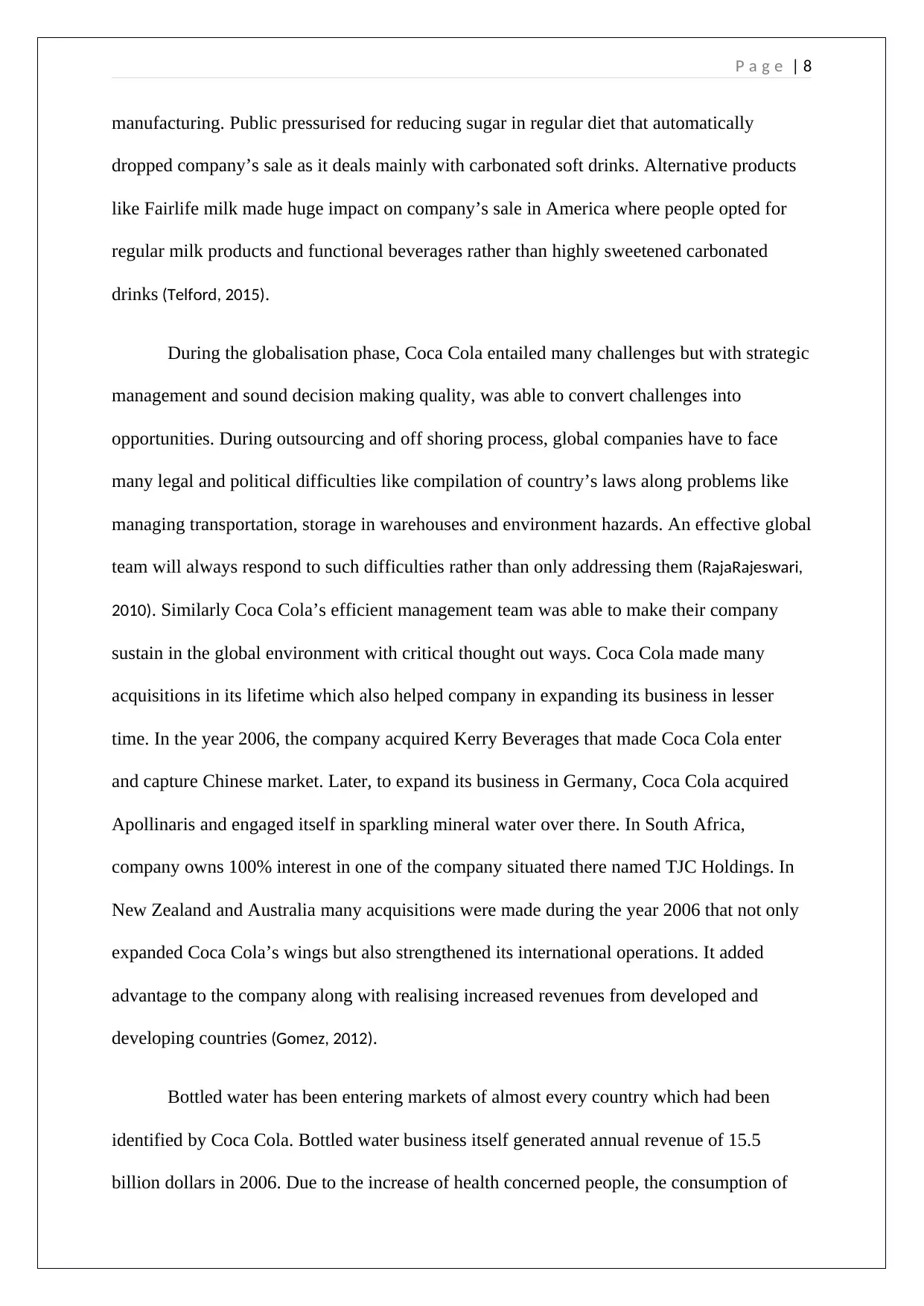
P a g e | 8
manufacturing. Public pressurised for reducing sugar in regular diet that automatically
dropped company’s sale as it deals mainly with carbonated soft drinks. Alternative products
like Fairlife milk made huge impact on company’s sale in America where people opted for
regular milk products and functional beverages rather than highly sweetened carbonated
drinks (Telford, 2015).
During the globalisation phase, Coca Cola entailed many challenges but with strategic
management and sound decision making quality, was able to convert challenges into
opportunities. During outsourcing and off shoring process, global companies have to face
many legal and political difficulties like compilation of country’s laws along problems like
managing transportation, storage in warehouses and environment hazards. An effective global
team will always respond to such difficulties rather than only addressing them (RajaRajeswari,
2010). Similarly Coca Cola’s efficient management team was able to make their company
sustain in the global environment with critical thought out ways. Coca Cola made many
acquisitions in its lifetime which also helped company in expanding its business in lesser
time. In the year 2006, the company acquired Kerry Beverages that made Coca Cola enter
and capture Chinese market. Later, to expand its business in Germany, Coca Cola acquired
Apollinaris and engaged itself in sparkling mineral water over there. In South Africa,
company owns 100% interest in one of the company situated there named TJC Holdings. In
New Zealand and Australia many acquisitions were made during the year 2006 that not only
expanded Coca Cola’s wings but also strengthened its international operations. It added
advantage to the company along with realising increased revenues from developed and
developing countries (Gomez, 2012).
Bottled water has been entering markets of almost every country which had been
identified by Coca Cola. Bottled water business itself generated annual revenue of 15.5
billion dollars in 2006. Due to the increase of health concerned people, the consumption of
manufacturing. Public pressurised for reducing sugar in regular diet that automatically
dropped company’s sale as it deals mainly with carbonated soft drinks. Alternative products
like Fairlife milk made huge impact on company’s sale in America where people opted for
regular milk products and functional beverages rather than highly sweetened carbonated
drinks (Telford, 2015).
During the globalisation phase, Coca Cola entailed many challenges but with strategic
management and sound decision making quality, was able to convert challenges into
opportunities. During outsourcing and off shoring process, global companies have to face
many legal and political difficulties like compilation of country’s laws along problems like
managing transportation, storage in warehouses and environment hazards. An effective global
team will always respond to such difficulties rather than only addressing them (RajaRajeswari,
2010). Similarly Coca Cola’s efficient management team was able to make their company
sustain in the global environment with critical thought out ways. Coca Cola made many
acquisitions in its lifetime which also helped company in expanding its business in lesser
time. In the year 2006, the company acquired Kerry Beverages that made Coca Cola enter
and capture Chinese market. Later, to expand its business in Germany, Coca Cola acquired
Apollinaris and engaged itself in sparkling mineral water over there. In South Africa,
company owns 100% interest in one of the company situated there named TJC Holdings. In
New Zealand and Australia many acquisitions were made during the year 2006 that not only
expanded Coca Cola’s wings but also strengthened its international operations. It added
advantage to the company along with realising increased revenues from developed and
developing countries (Gomez, 2012).
Bottled water has been entering markets of almost every country which had been
identified by Coca Cola. Bottled water business itself generated annual revenue of 15.5
billion dollars in 2006. Due to the increase of health concerned people, the consumption of
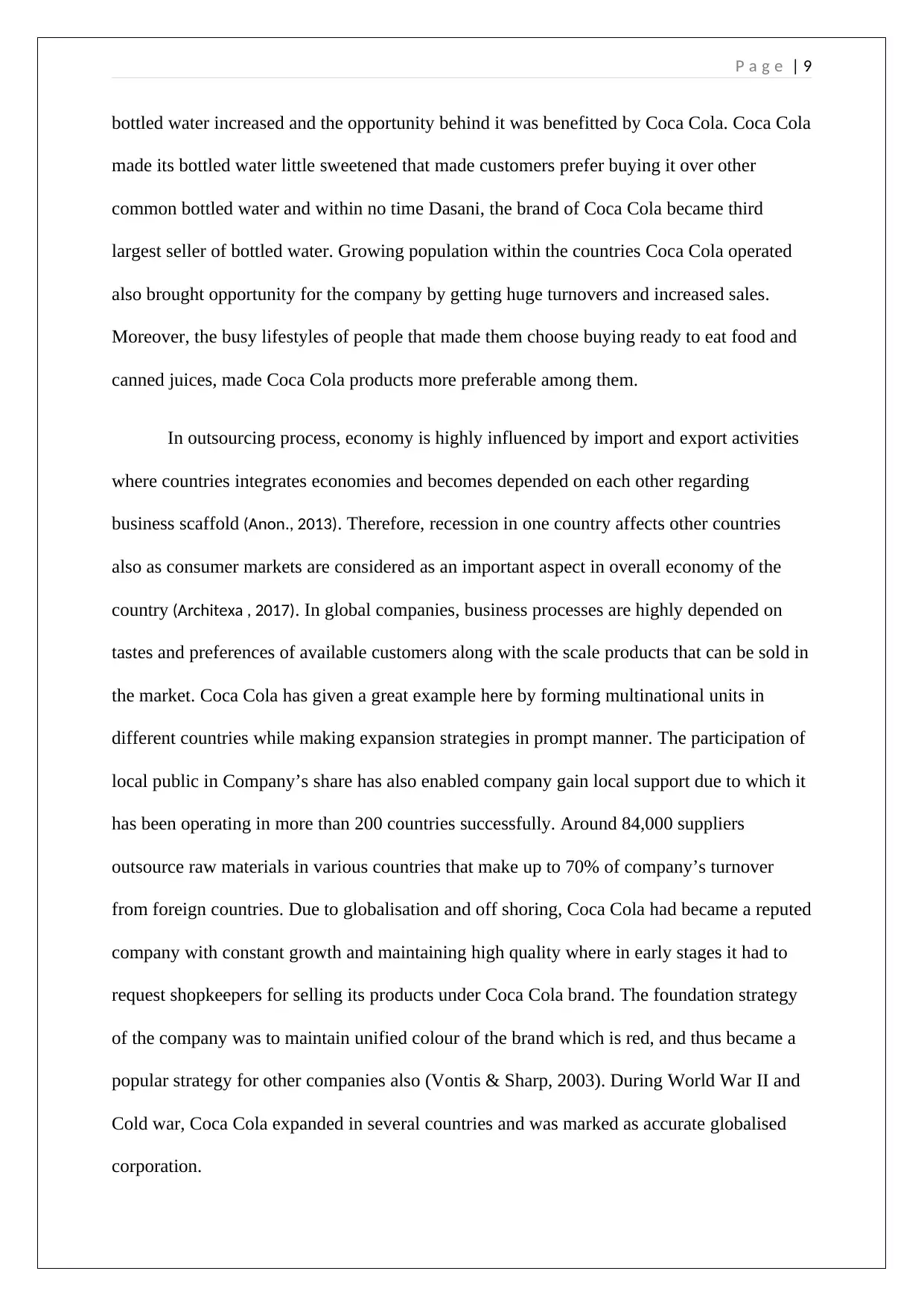
P a g e | 9
bottled water increased and the opportunity behind it was benefitted by Coca Cola. Coca Cola
made its bottled water little sweetened that made customers prefer buying it over other
common bottled water and within no time Dasani, the brand of Coca Cola became third
largest seller of bottled water. Growing population within the countries Coca Cola operated
also brought opportunity for the company by getting huge turnovers and increased sales.
Moreover, the busy lifestyles of people that made them choose buying ready to eat food and
canned juices, made Coca Cola products more preferable among them.
In outsourcing process, economy is highly influenced by import and export activities
where countries integrates economies and becomes depended on each other regarding
business scaffold (Anon., 2013). Therefore, recession in one country affects other countries
also as consumer markets are considered as an important aspect in overall economy of the
country (Architexa , 2017). In global companies, business processes are highly depended on
tastes and preferences of available customers along with the scale products that can be sold in
the market. Coca Cola has given a great example here by forming multinational units in
different countries while making expansion strategies in prompt manner. The participation of
local public in Company’s share has also enabled company gain local support due to which it
has been operating in more than 200 countries successfully. Around 84,000 suppliers
outsource raw materials in various countries that make up to 70% of company’s turnover
from foreign countries. Due to globalisation and off shoring, Coca Cola had became a reputed
company with constant growth and maintaining high quality where in early stages it had to
request shopkeepers for selling its products under Coca Cola brand. The foundation strategy
of the company was to maintain unified colour of the brand which is red, and thus became a
popular strategy for other companies also (Vontis & Sharp, 2003). During World War II and
Cold war, Coca Cola expanded in several countries and was marked as accurate globalised
corporation.
bottled water increased and the opportunity behind it was benefitted by Coca Cola. Coca Cola
made its bottled water little sweetened that made customers prefer buying it over other
common bottled water and within no time Dasani, the brand of Coca Cola became third
largest seller of bottled water. Growing population within the countries Coca Cola operated
also brought opportunity for the company by getting huge turnovers and increased sales.
Moreover, the busy lifestyles of people that made them choose buying ready to eat food and
canned juices, made Coca Cola products more preferable among them.
In outsourcing process, economy is highly influenced by import and export activities
where countries integrates economies and becomes depended on each other regarding
business scaffold (Anon., 2013). Therefore, recession in one country affects other countries
also as consumer markets are considered as an important aspect in overall economy of the
country (Architexa , 2017). In global companies, business processes are highly depended on
tastes and preferences of available customers along with the scale products that can be sold in
the market. Coca Cola has given a great example here by forming multinational units in
different countries while making expansion strategies in prompt manner. The participation of
local public in Company’s share has also enabled company gain local support due to which it
has been operating in more than 200 countries successfully. Around 84,000 suppliers
outsource raw materials in various countries that make up to 70% of company’s turnover
from foreign countries. Due to globalisation and off shoring, Coca Cola had became a reputed
company with constant growth and maintaining high quality where in early stages it had to
request shopkeepers for selling its products under Coca Cola brand. The foundation strategy
of the company was to maintain unified colour of the brand which is red, and thus became a
popular strategy for other companies also (Vontis & Sharp, 2003). During World War II and
Cold war, Coca Cola expanded in several countries and was marked as accurate globalised
corporation.
⊘ This is a preview!⊘
Do you want full access?
Subscribe today to unlock all pages.

Trusted by 1+ million students worldwide
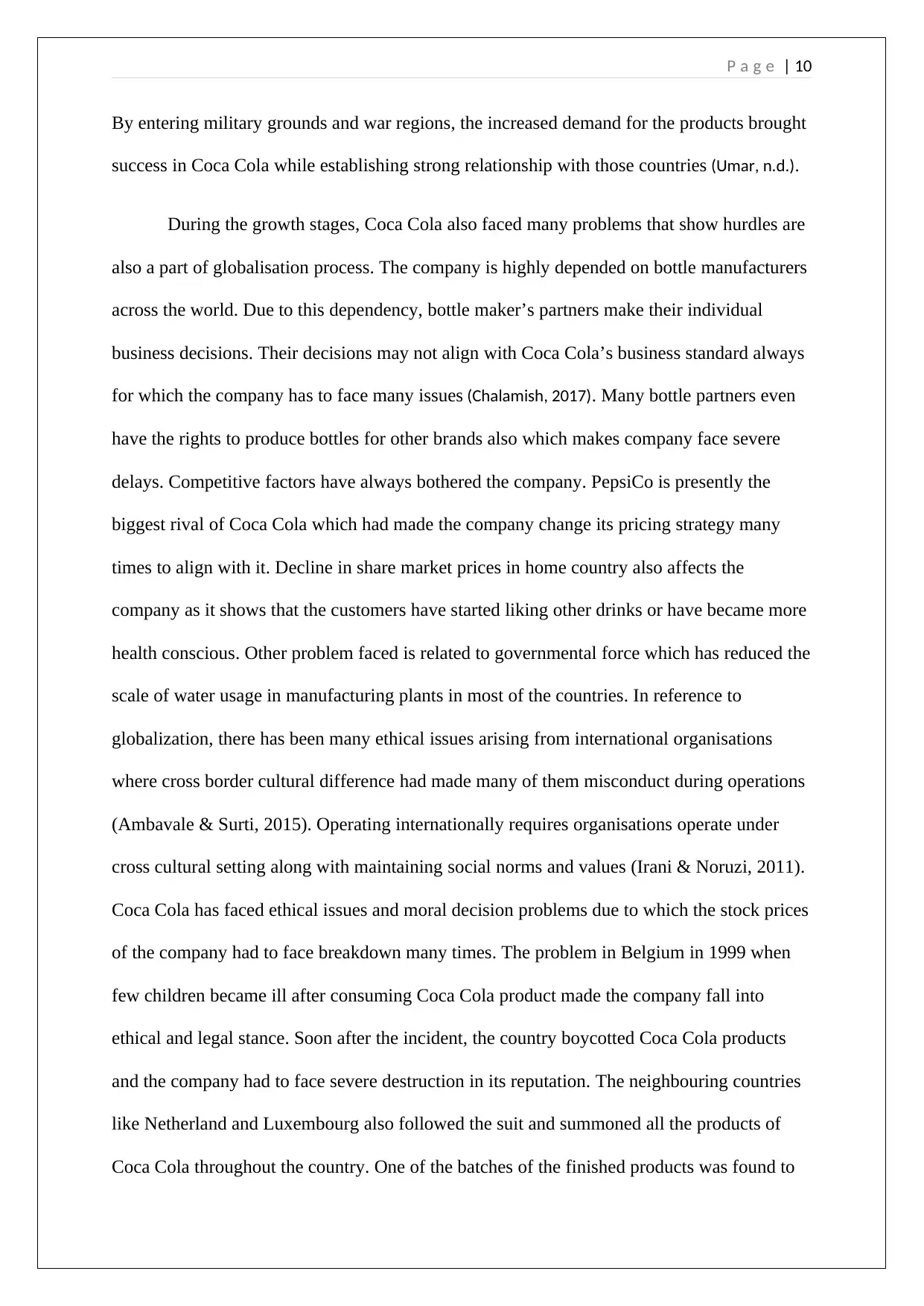
P a g e | 10
By entering military grounds and war regions, the increased demand for the products brought
success in Coca Cola while establishing strong relationship with those countries (Umar, n.d.).
During the growth stages, Coca Cola also faced many problems that show hurdles are
also a part of globalisation process. The company is highly depended on bottle manufacturers
across the world. Due to this dependency, bottle maker’s partners make their individual
business decisions. Their decisions may not align with Coca Cola’s business standard always
for which the company has to face many issues (Chalamish, 2017). Many bottle partners even
have the rights to produce bottles for other brands also which makes company face severe
delays. Competitive factors have always bothered the company. PepsiCo is presently the
biggest rival of Coca Cola which had made the company change its pricing strategy many
times to align with it. Decline in share market prices in home country also affects the
company as it shows that the customers have started liking other drinks or have became more
health conscious. Other problem faced is related to governmental force which has reduced the
scale of water usage in manufacturing plants in most of the countries. In reference to
globalization, there has been many ethical issues arising from international organisations
where cross border cultural difference had made many of them misconduct during operations
(Ambavale & Surti, 2015). Operating internationally requires organisations operate under
cross cultural setting along with maintaining social norms and values (Irani & Noruzi, 2011).
Coca Cola has faced ethical issues and moral decision problems due to which the stock prices
of the company had to face breakdown many times. The problem in Belgium in 1999 when
few children became ill after consuming Coca Cola product made the company fall into
ethical and legal stance. Soon after the incident, the country boycotted Coca Cola products
and the company had to face severe destruction in its reputation. The neighbouring countries
like Netherland and Luxembourg also followed the suit and summoned all the products of
Coca Cola throughout the country. One of the batches of the finished products was found to
By entering military grounds and war regions, the increased demand for the products brought
success in Coca Cola while establishing strong relationship with those countries (Umar, n.d.).
During the growth stages, Coca Cola also faced many problems that show hurdles are
also a part of globalisation process. The company is highly depended on bottle manufacturers
across the world. Due to this dependency, bottle maker’s partners make their individual
business decisions. Their decisions may not align with Coca Cola’s business standard always
for which the company has to face many issues (Chalamish, 2017). Many bottle partners even
have the rights to produce bottles for other brands also which makes company face severe
delays. Competitive factors have always bothered the company. PepsiCo is presently the
biggest rival of Coca Cola which had made the company change its pricing strategy many
times to align with it. Decline in share market prices in home country also affects the
company as it shows that the customers have started liking other drinks or have became more
health conscious. Other problem faced is related to governmental force which has reduced the
scale of water usage in manufacturing plants in most of the countries. In reference to
globalization, there has been many ethical issues arising from international organisations
where cross border cultural difference had made many of them misconduct during operations
(Ambavale & Surti, 2015). Operating internationally requires organisations operate under
cross cultural setting along with maintaining social norms and values (Irani & Noruzi, 2011).
Coca Cola has faced ethical issues and moral decision problems due to which the stock prices
of the company had to face breakdown many times. The problem in Belgium in 1999 when
few children became ill after consuming Coca Cola product made the company fall into
ethical and legal stance. Soon after the incident, the country boycotted Coca Cola products
and the company had to face severe destruction in its reputation. The neighbouring countries
like Netherland and Luxembourg also followed the suit and summoned all the products of
Coca Cola throughout the country. One of the batches of the finished products was found to
Paraphrase This Document
Need a fresh take? Get an instant paraphrase of this document with our AI Paraphraser
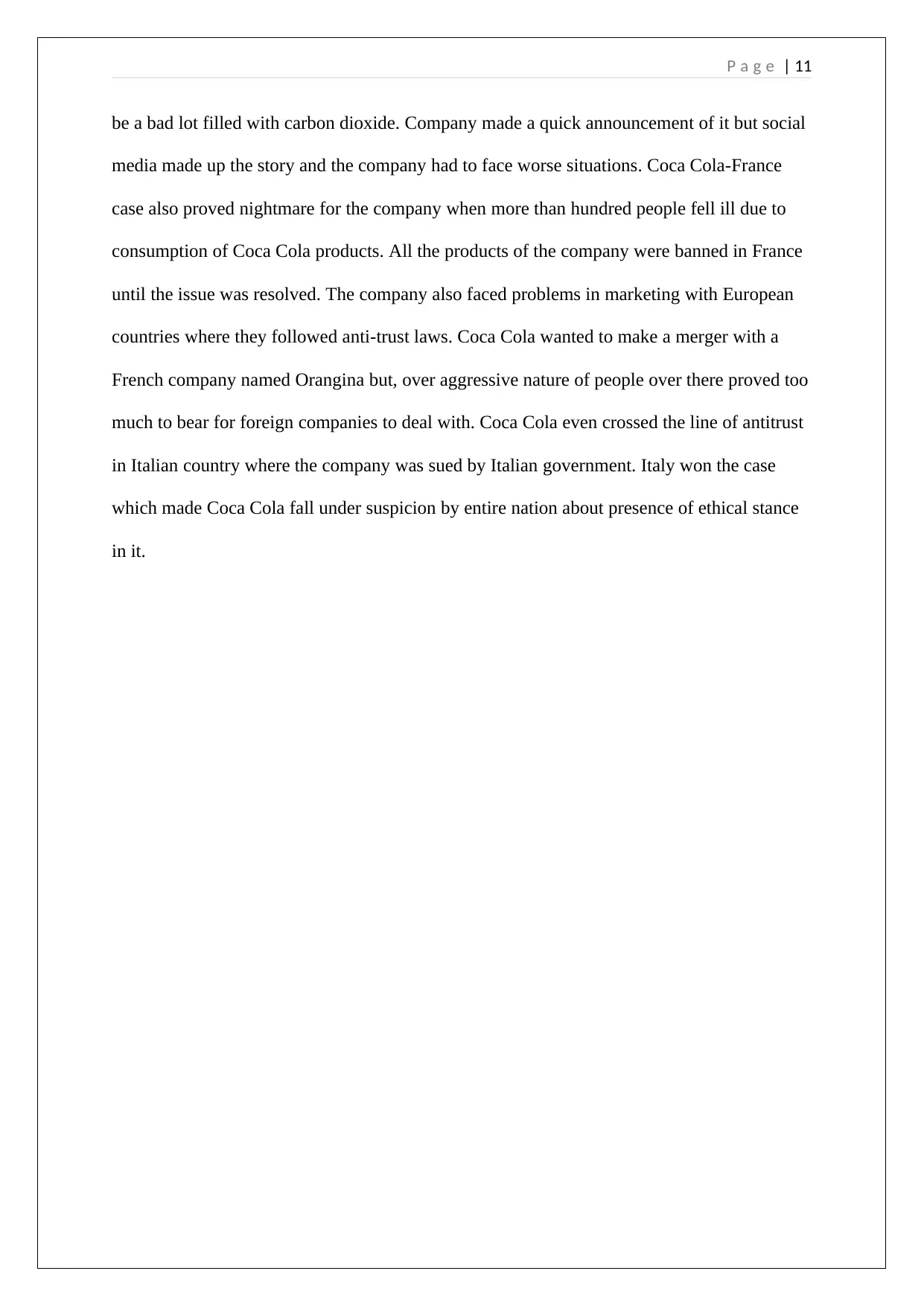
P a g e | 11
be a bad lot filled with carbon dioxide. Company made a quick announcement of it but social
media made up the story and the company had to face worse situations. Coca Cola-France
case also proved nightmare for the company when more than hundred people fell ill due to
consumption of Coca Cola products. All the products of the company were banned in France
until the issue was resolved. The company also faced problems in marketing with European
countries where they followed anti-trust laws. Coca Cola wanted to make a merger with a
French company named Orangina but, over aggressive nature of people over there proved too
much to bear for foreign companies to deal with. Coca Cola even crossed the line of antitrust
in Italian country where the company was sued by Italian government. Italy won the case
which made Coca Cola fall under suspicion by entire nation about presence of ethical stance
in it.
be a bad lot filled with carbon dioxide. Company made a quick announcement of it but social
media made up the story and the company had to face worse situations. Coca Cola-France
case also proved nightmare for the company when more than hundred people fell ill due to
consumption of Coca Cola products. All the products of the company were banned in France
until the issue was resolved. The company also faced problems in marketing with European
countries where they followed anti-trust laws. Coca Cola wanted to make a merger with a
French company named Orangina but, over aggressive nature of people over there proved too
much to bear for foreign companies to deal with. Coca Cola even crossed the line of antitrust
in Italian country where the company was sued by Italian government. Italy won the case
which made Coca Cola fall under suspicion by entire nation about presence of ethical stance
in it.
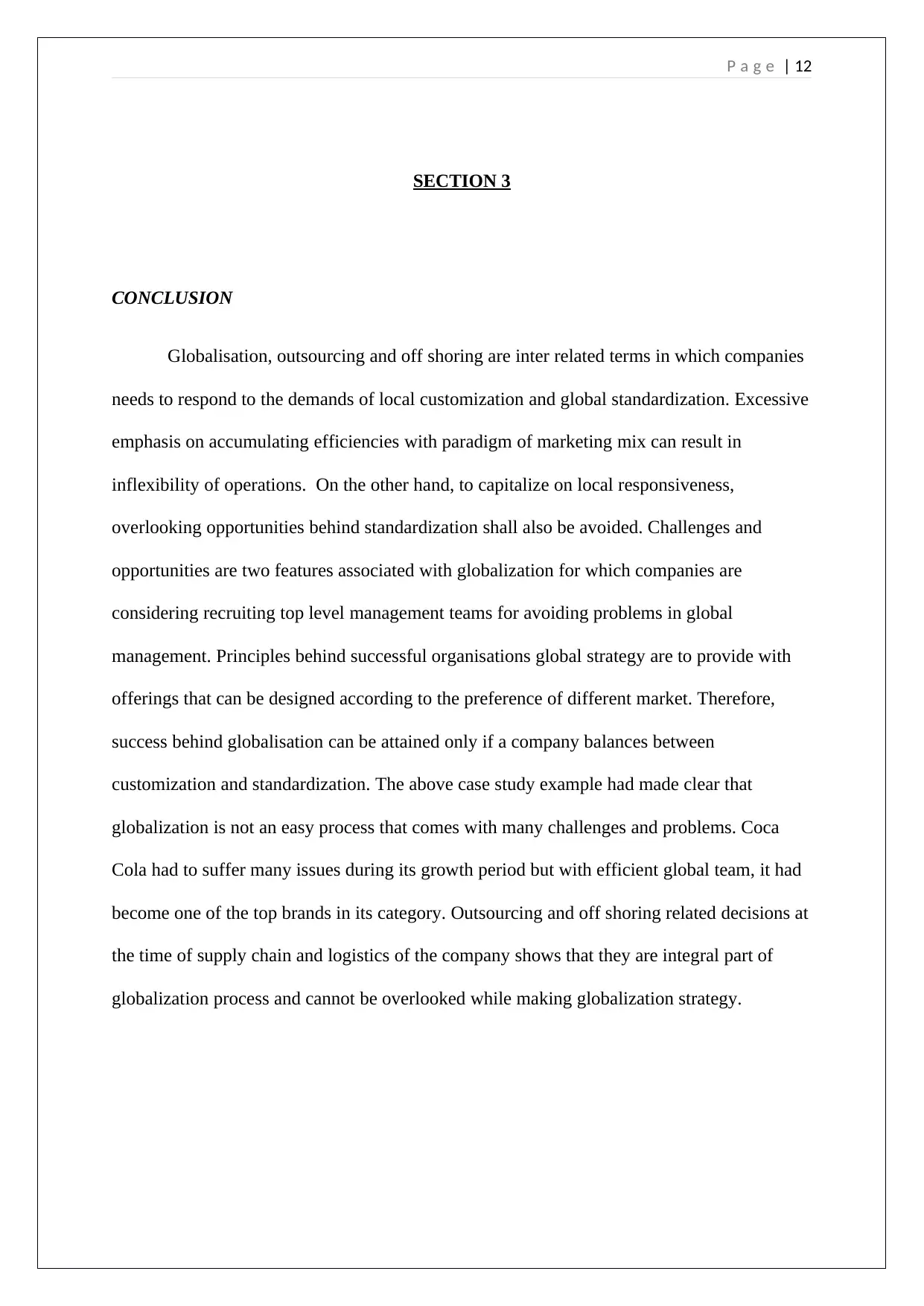
P a g e | 12
SECTION 3
CONCLUSION
Globalisation, outsourcing and off shoring are inter related terms in which companies
needs to respond to the demands of local customization and global standardization. Excessive
emphasis on accumulating efficiencies with paradigm of marketing mix can result in
inflexibility of operations. On the other hand, to capitalize on local responsiveness,
overlooking opportunities behind standardization shall also be avoided. Challenges and
opportunities are two features associated with globalization for which companies are
considering recruiting top level management teams for avoiding problems in global
management. Principles behind successful organisations global strategy are to provide with
offerings that can be designed according to the preference of different market. Therefore,
success behind globalisation can be attained only if a company balances between
customization and standardization. The above case study example had made clear that
globalization is not an easy process that comes with many challenges and problems. Coca
Cola had to suffer many issues during its growth period but with efficient global team, it had
become one of the top brands in its category. Outsourcing and off shoring related decisions at
the time of supply chain and logistics of the company shows that they are integral part of
globalization process and cannot be overlooked while making globalization strategy.
SECTION 3
CONCLUSION
Globalisation, outsourcing and off shoring are inter related terms in which companies
needs to respond to the demands of local customization and global standardization. Excessive
emphasis on accumulating efficiencies with paradigm of marketing mix can result in
inflexibility of operations. On the other hand, to capitalize on local responsiveness,
overlooking opportunities behind standardization shall also be avoided. Challenges and
opportunities are two features associated with globalization for which companies are
considering recruiting top level management teams for avoiding problems in global
management. Principles behind successful organisations global strategy are to provide with
offerings that can be designed according to the preference of different market. Therefore,
success behind globalisation can be attained only if a company balances between
customization and standardization. The above case study example had made clear that
globalization is not an easy process that comes with many challenges and problems. Coca
Cola had to suffer many issues during its growth period but with efficient global team, it had
become one of the top brands in its category. Outsourcing and off shoring related decisions at
the time of supply chain and logistics of the company shows that they are integral part of
globalization process and cannot be overlooked while making globalization strategy.
⊘ This is a preview!⊘
Do you want full access?
Subscribe today to unlock all pages.

Trusted by 1+ million students worldwide
1 out of 17
Related Documents
Your All-in-One AI-Powered Toolkit for Academic Success.
+13062052269
info@desklib.com
Available 24*7 on WhatsApp / Email
![[object Object]](/_next/static/media/star-bottom.7253800d.svg)
Unlock your academic potential
Copyright © 2020–2026 A2Z Services. All Rights Reserved. Developed and managed by ZUCOL.





